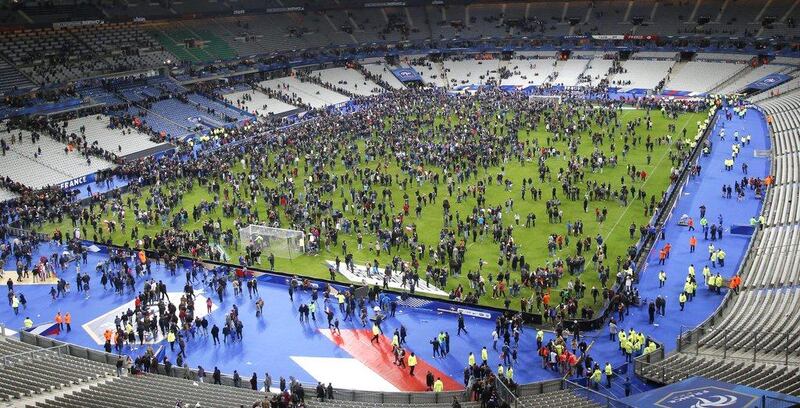BEIRUT // In Paris they played dead on the bloody floor of a music hall, hoping that the gunmen executing concertgoers did not notice them. In Beirut, they were shopping or coming home from work along a crowded market street when the first bomber hit. More were cut down by a second explosion as they rushed to help the injured and look for loved ones.
Little is known about the final moments of Metrojet 9268 on October 31, but as it reached cruising altitude over the Sinai Peninsula one can imagine some of its passengers were reflecting on their beachside holidays, dreading the upcoming work week or trying to calm their fear of flying.
In the span of just two weeks, nearly 400 people were killed in these events, all of which were claimed by ISIL or its affiliates. The incidents in France and Egypt represent the most deadly ISIL attacks outside of their proclaimed caliphate, with the attack in Beirut ranking very high on that list as well.
While ISIL immediately claimed the downing of the Russian Metrojet flight, it remains under investigation, though evidence has increasingly pointed to a bomb being on board the aircraft and given legitimacy to ISIL’s claim.
The extremist group has a long history of massacring civilians, but the latest stand out: they took place far from ISIL’s proclaimed caliphate, where the group has committed its worst atrocities, and showed a sophistication in planning and professionalism in execution that yielded extremely high death tolls. These were not hastily put together statements. These attacks were meant to be spectacular and extraordinary.
The scenes of destruction and bloodshed splashed on screens and broadsheets across the world could signify a shift in ISIL’s strategy to the far enemy — or they could just reflect the next step in the planned evolution of the group, or a sudden string of successes where they have failed before.
"If the Paris attack and those in Egypt and Lebanon were all directed by ISIS Central, they represent a major shift in its global strategy," William McCants, a scholar at the Brookings Institution and the author of The ISIS Apocalypse, tweeted on November 14.
Charlie Winter, a security analyst who focuses on ISIL, suggested the move to significant attacks abroad was likely a sign of the group’s evolution rather than a shift.
“I think it doesn’t signify a shift necessarily, but it is a new appendage which has been added onto the already existing Islamic State strategy,” Mr Winter told The National. “I think the focus of ISIL is still on building a caliphate in the territories where it has a measure of security and social, economic and political control.”
The significance of the latest attacks lies in their execution and the risk ISIL ran in claiming them.
The targets were difficult and the attacks did not appear to be carried out by amateurs. In Beirut, bombers had to get into an area monitored closely by Hizbollah’s militia, a place where outsiders are frequently detained and residents always on guard. If ISIL’s Sinai affiliate was indeed responsible for the downing of the Metrojet flight, they would have had to get a bomb onto an international flight — a task perhaps easier in Egypt, where airport security is notoriously lax, than elsewhere but still a rarely attempted feat in the post 9/11 world. And in the Paris attacks, which French president Francois Hollande said were decided and planned in Syria, organised in Belgium and perpetrated with French accomplices, the gunmen and bombers had to coordinate their strikes while picking targets with high potential for casualties but low risk of immediate confrontation with security forces.
In the cases of Egypt and France, ISIL risked major military retaliation from Moscow and Paris at a time when its forces have suffered territorial losses to Kurdish forces. France initiated its retaliation on Sunday, hitting Raqqa with 20 air strikes at a time when coalition strikes on ISIL’s heartland in Syria have dwindled.
But rather than the high-profile massacres showing a shift in the group’s strategy, some see the latest attacks as ISIL finally seeing success in its commonly reiterated threats to bring terror to distant enemies.
“The Paris attacks do not represent a shift in ISIS’s strategy. Rather, they represent a major success in ISIS’s announced plans to encourage, resource and direct terror attacks in the West,” researchers from the Institute for the Study of War and the American Enterprise Institute wrote on Monday.
Aymenn Jawad Al Tamimi, a research fellow at the Philadelphia-based Middle East Forum who monitors extremist groups in Iraq and Syria, agreed that the latest attacks were not so much a shift in strategy as ISIL meeting success in its proclaimed goals.
“In the case of the attacks in Europe, ISIL-linked sleeper cells and sophisticated plots have long been on the radar of intelligence services,” he said. “The difference this time is that the Paris plot escaped the clutches of prevention and came to fruition.”
Mr Winter agreed that ISIL has been trying to pull off a major attack in Europe for quite sometime now, though was unsuccessful until Friday.
“Every time you hear about these major arrests, they’re arrested for attacks which would be similar to this that didn’t get through. So what we’re seeing here is just another attack, one of many plots, which did manage to slip through the net,” said Mr Winter.
In determining if these latest attacks signify a shift in ISIL’s strategy, Mr Tamimi said it was important to see where the orders came from: whether they were ordered by ISIL’s leadership in Iraq and Syria or planned and organised outside of the caliphate by affiliates.
In risking retaliation for recent attacks, Mr Tamimi said “I think ISIL expected retaliation and it hopes this will strengthen Muslim [versus] non-Muslim polarisation.”
jwood@thenational.ae





